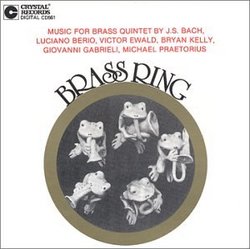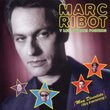| All Artists: Luciano Berio, Michael Praetorius, Giovanni Gabrieli, Johann Sebastian Bach, Victor Ewald, Bryan Kelly, The Brass Ring Title: Brass Ring - Berio, Praetorius, Gabrieli, Bach, Ewald, Kelly Members Wishing: 0 Total Copies: 0 Label: Crystal Records Release Date: 12/27/1993 Genres: Dance & Electronic, Classical Styles: Opera & Classical Vocal, Chamber Music, Historical Periods, Baroque (c.1600-1750), Classical (c.1770-1830) Number of Discs: 1 SwapaCD Credits: 1 UPC: 009414756121 |
Search - Luciano Berio, Michael Praetorius, Giovanni Gabrieli :: Brass Ring - Berio, Praetorius, Gabrieli, Bach, Ewald, Kelly
 | Luciano Berio, Michael Praetorius, Giovanni Gabrieli Brass Ring - Berio, Praetorius, Gabrieli, Bach, Ewald, Kelly Genres: Dance & Electronic, Classical
|
Larger Image |
CD DetailsSimilar CDs
|
CD ReviewsBrass Through the Ages Dr. Christopher Coleman | HONG KONG | 09/15/2004 (4 out of 5 stars) "Amazon's a bit parsimonious with the information on this CD, so let me tell you that Brass Ring is a brass quintet, originally founded at Yale but at the time of this recording ensemble-in-residence at the University of Hartford Hartt School of Music Community Division. Personnel on this recording are Daniel D'Addio and Claire Newbold, trumpets; Kirsten Bendixen, horn; David Kayser, trombone; and Karl Kramer, tuba.
The CD contains music from the Renaissance to the present. Probably the most engaging work on the CD is Bryan Kelly's Suite Parisienne. It means a lot for me to say this, as these sorts of light travelogue-character pieces usually bore me at best with their endless succession of triviality and cliché. But Kelly, an Englishman born in 1934 who studied with Nadia Boulanger, avoids these common pitfalls and creates an effective portrait of the city without being mundane. The instrumentalists respond to Kelly's composition and do their best in this colorful work. Viktor Ewald's Quintet #1 in Bb minor represents the Romantic period, and Ewald's quintet fares less well--as one of the very few Romantic pieces originally composed for brass it's very well known to brass players. (I'm a trombonist.) To me, Brass Ring's style doesn't do justice to the work--the last movement seems rushed--it's marked allegro moderato (moderately fast) and throughout the entire piece a clipped, separated articulation is favored which diminishes the phrasing and seems most un-Russian to me. The second movement of the Ewald fares better--the opening is lovely, but when it recurs with an obligato, the articulations of the obligato are approached at first with some unconvincingly staccato which is later dropped as though in recognition of its stylistic peculiarity. Early music is represented by Michael Praetorius's Dances from Terpsichore; two short works by Giovanni Gabrieli and another short piece by J. S. Bach, all in effective arrangements by the ensemble's tubist. These pieces come off nicely, and the slight tendency toward a more articulated approach than I'd prefer in the first Gabrieli does it no real harm. Some terrific high trumpet in Praetorius's Courante is notable for its brightness as well as its relative rarity in the rest of the CD; and the tiny Volta movement of the same piece is a miniature delight. Berio's punchy fanfare "Call" opens the CD with a pointillistic approach featuring highly accented trumpets in some of the most exciting performances here, but it loses a bit of interest as it continues into a more active exploration of color with some nice Harmon muted effects but little direction. At just over 4 minutes it is not likely to offend anyone; nor is it thoroughly engaging." |

 Track Listings (16) - Disc #1
Track Listings (16) - Disc #1

